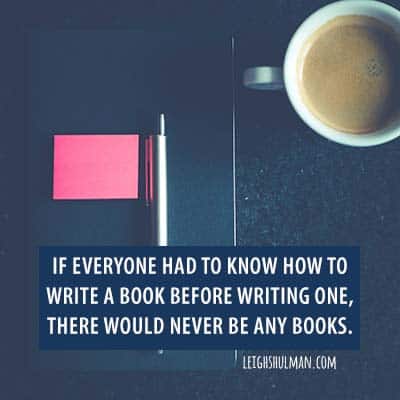There are many things every new writer experiences. Fear. Wondering if what you’re writing is good enough. The first time you sit down to write can be exhilarating, but it’s likely that at some point, you’re going to get stuck. When you do, it’s often because you believe something about yourself or your writing that simply isn’t true. Too often, you create expectations for your writing before you’ve given yourself a chance to play, experiment and even make mistakes.
This list is 10 of the most common things you’re likely to experience when you first begin writing. And with a little practice, you’ll learn how to move past them and continue writing so you can finish, publish, and reach your writing goals.
1. Your inspiration fades
You know how it is. You have an amazing idea for a story that’s burning you up to write, and when you sit down, the words flow from your brain to your pen to the page like honey. As a writer, it’s the best feeling ever. Then after a few pages, you have nothing left to say. You’re not sure what to do next, so you stop writing. You probably never go back.
This is inspiration. It’s a gorgeous thing when it happens, but it won’t help you finish writing. Instead, you’ll have to muscle through the discomfort of not knowing what ’s happening. You’ll have to sit down and write without the golden wings of inspiration.
Here’s the secret: It will come back. You just have to keep writing until it returns. Of course, it will fade again, then return. Such is the nature of writing. Understand this, and you know exactly how to proceed when the inspiration well runs dry.

2. You don’t finish what you start
I’ve got some tough love for you here. A piece of writing you never finished doesn’t count. It doesn’t matter how stellar your ideas are. It doesn’t matter if you’re the most brilliant person on earth. What you don’t finish, may as well not exist. It may as well not exist, because no one can read it, share it, be inspired by it, publish it or love it. An unfinished piece of writing merely languishes, waiting for your attention.
Do yourself a favor, even if you think you’re writing the worst, corniest, crappiest thing in the world, give your idea a fighting chance by actually finishing. You can decide later what you want to do with it.
3. You judge your writing as you’re writing
People often think they’re editing when really they’re dumping negativity and judgment on their writing.
What’s the difference?
When you edit, you see the structure and form of your writing. You understand its themes. Editing requires removing pieces that don’t need to be there and adding things that do. The writing in many ways guides itself.
When you judge, you tell yourself what you wrote is not good. It’s not constructive. It doesn’t offer a way to improve. It just makes you want to stop writing.
4. You think you need experience in order to start
If everyone had to know how to write a book before writing one, there would never be any books. Because the only way to learn to write a book is by actually writing one. You learn on the job. The same applies to pitching articles, copywriting and most other forms of writing.
Yes, potential clients and editors want to know you’ll write something worthy of publishing. They need to believe you’ll meet deadlines and be professional in order to hire you.
That’s what pitches, queries and submissions are for. Your initial writing introducing yourself and the piece you want to write shapes the project and communicates to an editor how you write, whether your writing is a good fit and gives them insight into whether it’s worth taking a chance to hire you.
You may be rejected. Everyone is rejected.
No one starts with experience, and plenty writers have pitched high and landed books deals, well paying research articles and begun their careers on the very first piece of writing the pitched.
Imagine if they had waited around until they had this magical “enough experience.”
5. You worry you’re not good enough
What does it even mean to be good enough? Is there really a magic line that says when you’re good enough and when you’re not? Sorry, but this is just an excuse to hold you back.
Not good enough is relative to the point of meaningless. Good enough for what? For whom?
Are you really going to let some arbitrary judgment hold you back from writing if you truly want to write? Besides, writing is a practice. The more you do it, the more you improve.
6. You compare yourself to other writers

“Comparison is the thief of joy,” said Theodore Roosevelt. It’s become a mantra of mine. It doesn’t matter what someone else writes. It doesn’t matter how beautiful their prose. It doesn’t matter how widely acclaimed their books is or how loving their family is or how big the slice of chocolate cake they’re eating might be.
Because what they do is what they do. And you are you. Your story is different. It’s yours. You can’t be someone else. You can only embrace yourself and the work you do. Focus on your writing instead. Finish it. Build it. Grow it. Meet your own goals and make your own challenges.
That’s where the worth lies.
7. You think publishing is the goal of writing
When you tell someone you’re a writer, almost always the first question you’ll hear is “Have I read anything you’ve written?” There’s an unavoidable judgment there. It’s no wonder people focus more on publishing than writing.
Writing and publishing, while obviously connected, are two very different kinds of work. Writing is the creative side. You tell your story, share your values, connect with others. Publishing is the business side of what you write. You don’t publish, though, until you’ve fully finished writing a piece and are ready to let it go into the world.
Publishing is what I call “brushing your teeth.” It’s a very specific set of tasks you perform in order to send your writing into the world. Publishing is also not a measure to value the worth of your book. Publishing is business. It’s about timing, and what’s a good fit and what’s in fashion to read right now.
There are endless lists of women and people of color who weren’t able to publish for most of the history. Not because they weren’t writing things of worth, but because the publishing industry discounted them before they even wrote. We are thankfully living in a time when there are many more publishing options. There is always a way to get your writing out there.
When you focus on publishing as you write, you ruin your chances of writing something authentic. You trash your own story because you’re too busy thinking about what happens later. Write first.
8. You worry you don’t know what you’re doing
You probably don’t know what you’re doing. Not all the time. No writer knows what they’re doing all the time. Not if they want to innovate. It’s the area beyond what we know and what we’ve done where the most interesting writing happens. And yes, writing when you’re not sure what happens next is hard and worrying and unstable. It’s frustrating and makes you want to give up.
Here’s a secret. When you struggle most with your writing, it usually means you’re doing something you’ve never done before. It means you’re about to push through to a new level a new creativity and have a breakthrough. It’s uncomfortable, yes, but the high of creating something unique and beautiful is even better than inspiration. Push through. You’ll get there.
9. You think you need a degree in writing
I have an MA in writing. I’m glad I did it because it gave me a place to focus on my writing. I had regular workshops and worked with amazing teachers. I also got a piece of paper that says I can teach writing in universities. These are good reasons to get a writing degree, but there are many other ways to have all the things a degree gives you without spending the time and money to get one.
If you want a degree, by all means, go for it. But it’s not a secret password to the world of writing, and it’s not the only way to write.
Some of the best writers in the world never had a formal writing education. Instead, they learned by practice, by pushing their boundaries, by reading books and editing their own writing and the work of others.
10. You’ll want to give up
I’ve been writing as long as I can remember and still sometimes a thought sneaks into my head whispering “Maybe you should just give it all up and stop writing.” But then I think, stop writing for what? What else am I going to do?
The only reason I even think of quitting is that I’m frustrated. But any job you have brings frustration at some point. You can’t avoid it. Better to face the frustration of writing than to never write at all.
Bottom line, trust yourself!
The best advice I ever got or gave related to writing was “Trust yourself.” You’ll decide what to write. You’ll decide which edits to take seriously. You’ll decide the direction of your writing career. You have no choice but to trust yourself. Luckily, you can. It’s the very best way to write.
I’m not a new writer, but I’ll always have something new to learn. That’s the real secret. We’re never really done growing and moving forward in our work. That’s what makes it frustrating sometimes, but it also makes it exciting.
So when you’re just beginning, ignore all the things you think you should be doing or other people’s expectations, and instead get your words on the page! If you want support, get it. If you need feedback, ask for help. And if you want to write, then you just put pen to paper or fingers to keyboard and get on with it already.
